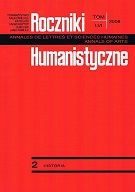Czyn jako wyznacznik wielkości bohatera. O neoromantycznych ideałach polskiej historiografii
The Deed as a Determinant of the Hero's Greatness. On the Neo-romantic Ideals of Polish Historiography
Author(s): Iwona KościeszaSubject(s): History
Published by: Towarzystwo Naukowe KUL & Katolicki Uniwersytet Lubelski Jana Pawła II
Keywords: deed; national hero; Polish historiography of the turn of the nineteenth and twentieth centuries; Szymon Askenazy; Szymon Askenazy’s school; national uprisings; czyn; bohater narodowy; historiografia polska przełomu XIX/XX wieku; Szymon Askenazy
Summary/Abstract: The writing of Szymon Askenazy and his disciples represents the independent line In historiography. Their works were written in the period when political life and thinking were intensive in the Polish territories. They had considerably affected the historical and political awareness of Polish society. The hero’s image created in the historians’ writings drew on to the romantic struggles for freedom. This image of the hero had a didactic dimension in accordance with the principle that “history is the teacher of life.” The deed was one of the basic elements and made up his image. He was often a sufficient factor that decided about the greatness of a hero. Despite the fact that historians glorified above all an armed deed, actions taken by the hero in the area of politics and education were also important. The main place in Askenazy’s school is occupied by the hero who with a weapon in his hands struggles for Poland’s independence, i.e., Prince Józef Poniatowski or Jan Henryk Da˛browski. The moral authority who embodies the “national virtue” is Tadeusz Kos´ciuszko. Another place is occupied by such persons as Prince Adam Czartoryski or Ksawery Drucki Lubecki. Following these heroes, historians show various forms of the service to our homeland. Their actions were made concrete by their deed. Its basic function in narration was to establish images about the hero. Such images functioned in the historical awareness of society.
Journal: Roczniki Humanistyczne
- Issue Year: 56/2008
- Issue No: 02
- Page Range: 209-227
- Page Count: 19
- Language: Polish

